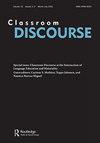Multimodal Participation and Engagement. Social Interaction in the Classroom
IF 1.6
Q2 EDUCATION & EDUCATIONAL RESEARCH
引用次数: 1
Abstract
This book provides an in-depth, systematic investigation of student participation in the classroom. It studies the phenomenon from several different angles, taking into account students’ displayed identities, their willingness – or not – to take part in the joint construction of the class, the norms and expectations teachers and learners in classrooms orient to, and the ways in which these are reflexively and jointly brought about. The methodology to investigate these phenomena is Conversation Analysis – a highly appropriate choice considering that participation in classrooms is intricately linked with social interaction. The author’s point of departure is a very central student problem, namely that there might be ‘misalignment’ between what teachers understand by ‘participation’ and what students take it to mean. In her analysis, however, Jacknick moves away from the lay category of ‘participation’ as it is used in pedagogical contexts as a common (albeit, scarcely defined) criterion for evaluation and presents a complex model of multimodal participation and engagement based exclusively on her empirical data. She analyses teaching and being taught as processes that are enacted and co-constructed in classroom interaction. Her aim is to further our understanding of how student participation in classrooms works through a detailed examination of its multimodal complexity. The book starts with one of the most enjoyable introductions to an academic book I have read for a long time. To my great surprise, I suddenly found myself in the middle of a Harry Potter movie! The author very entertainingly analyses an extract of one of the films, complete with close-ups of the film’s characters. She uses this analysis to show how misalignments between teacher expectations and student perspectives in terms of participation lead to categorisations of students as ‘good’ or ‘bad’ within the first few moments of a class.多模式参与和参与。课堂上的社会互动
这本书对学生在课堂上的参与进行了深入、系统的调查。它从几个不同的角度对这一现象进行了研究,包括学生所表现出的身份,他们是否愿意参与课堂的共同建设,课堂上教师和学习者所适应的规范和期望,以及这些规范和期望是如何反射性地共同产生的。研究这些现象的方法是对话分析——考虑到课堂参与与社会互动有着复杂的联系,这是一个非常合适的选择。作者的出发点是一个非常核心的学生问题,即教师对“参与”的理解与学生对“参与”的理解之间可能存在“错位”。然而,在她的分析中,Jacknick脱离了“参与”的外行范畴,因为它在教学环境中被用作一种常见的(尽管几乎没有定义)评估标准,并基于她的经验数据提出了一个复杂的多模式参与和参与模型。她分析了教学和被教作为在课堂互动中制定和共同构建的过程。她的目的是通过对多模态复杂性的详细研究,进一步了解学生参与课堂的方式。这本书的开头是我很长时间以来读过的一本学术书籍中最令人愉快的介绍之一。令我非常惊讶的是,我突然发现自己正在看哈利波特电影!作者非常有趣地分析了其中一部电影的节选,并配上了电影人物的特写。她利用这一分析表明,在参与方面,教师的期望和学生的观点之间的不一致是如何导致学生在上课的最初几分钟内被划分为“好”或“坏”。
本文章由计算机程序翻译,如有差异,请以英文原文为准。
求助全文
约1分钟内获得全文
求助全文

 求助内容:
求助内容: 应助结果提醒方式:
应助结果提醒方式:


